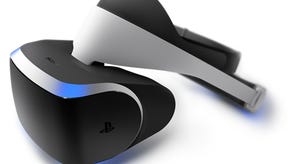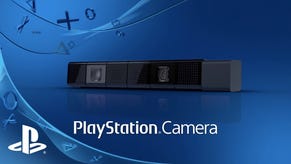E3: Undivided House - SCEE boss open and optimistic
The head of Sony Computer Entertainment Europe in a frank interview on Vita, PlayStation Suite, Move and 3D, Sony's E3 and – of course – the PSN outage.
SCE's Andrew House was frank and forthcoming in an interview today about where Sony's standing in its ten-year plan for the PS3, as well as how Vita and the PlayStation Suite are redefining its place in the portable market. He presents an image of a company moving past the PSN hack to realign the focus on the quality of its offerings, rebuilding trust by emphasising consumer satisfaction with the PlayStation brand. Read on for his thoughts on the Vita pricing, how gaming is key for pushing 3D, and where Sony's strategy is heading in the coming year, once E3 is (finally) over.
VG247: Jack Tretton was very upfront about the PSN issue at the press conference. Was that something that you felt Sony had to do?
Andrew House: Yes, I thought it was very important. As Jack said in his inimitable fashion, it was an elephant in the room. It absolutely needed to be addressed and I think Jack did a very good job talking about what our priorities are. Most importantly, and what I would re-echo, is to say how hugely humbled we are by consumers continuing to place their trust in us, and that we are on the first few steps of a long path to working towards regaining that trust, and being worthy of it, and doing everything that we can to make the consumer experience not only entertaining and engaging but also secure.
How's your E3 going?
I think it's going very well. We're feeling very confident about continuing to deliver great games and content for PlayStation 3. From what I can tell and from most people I've spoken to, I think the price point for Vita ha been a positive surprise. I think it's an aggressive price point, we set out to do that deliberately. It's important particularly in the portable space to build momentum and move very quickly. Obviously we're going to appeal to a core gamer audience and technology enthusiast, but we're moving very swiftly into more of a massmarket proposition. The price is one key step in helping us to do that.
Is this indicative of a larger shift within SCE from specialist gadget-focussed audience to a more massmarket proposition?
That's an interesting question. If you look back at the history of PS2, I'd describe that as a pretty massmarket device. I think the shift has been, in line with industry trends, towards more multifunctional, broader appeal devices, as opposed to very gaming-only focussed ones.
I have almost contradicted myself – I think Vita is primarily and obviously designed with gaming at its heart, but because of its range of connectivity options, because of the kinds of interfaces that it has, it doesn't necessarily need to be purely limited to gaming. So I think that’s probably the trend that we're seeing most. It's a very different strategy for Sony than for some of our competitors, and that's based on the company's heritage on being a more general device and entertainment-focussed companies.
"Vita is primarily and obviously designed with gaming at its heart"
What does the word mass-market actually mean now? Is it synonymous with casual for you?
Casual is perhaps defined around audience profile and the kind of games that people play. Massmarket for me, quite simply, is more quantifiable around numbers. I think when you start to get up into significant tens of millions of units worldwide, then you're starting to have what I would characterise as massmarket appeal. I don't think we're there yet on PS3. But we've said right from the start that the PS3 lifecycle would be a long one, and perhaps have a different shape than we've seen with previous format. That's playing out.
It's significant that PS3 is enjoying year on year growth, whereas certainly for one of our competitors there is quite significant decline year on year, and that is testament to a differing strategy, a different shape of life cycle.
Is your emphases on console sales, or delivering services like Qriocity?
That's a difficult question to answer. I think they're both important. The critical thing for PS3 is, obviously, to build significant consumer appeal in terms of size of audience. But our ongoing challenge, and one that we've fulfilled reasonably well today, is to continue to add more value to the platform over time, and that's through additional services. Now with 3D, we're taking the device and showing the consumer that there's so much more to be had there. Playstation Move is less than a year old, there's a lot of innovation we can see there in terms of content for that. That for me is the strongest challenge, that's our mantra with PS3.
How important is it to Sony to be the world number one in terms of console sales?
We want to be, obviously, in a leadership role in whatever market we enter into. But I think the more important thing is consumers that are satisfied and have great value from the experience.
There was a heavy emphasis on Move in the press conference. How important would you say it is going forward?
I think it's important, it's one of the key tools to offer innovation in games, differentiated experiences, but it's not for us the be all and end all. It's balanced with having great game experiences overall, it's balanced with an increasing push into 3D games, and then of course there's Move combined with 3D, which opens up a whole other range of experiences for people. So it's important, but it's one of many tools that we have to build consumer appeal.
On PS Move: "It's not for us the be all and end all"
3DTV marketing has been focussed primarily on blu-ray and film, on cinematic experiences. Why did you choose to announce the new 3D display that you're launching now, at the biggest gaming conference in the world?
That was very deliberate. The importance of that product is twofold: one, it's a bold move to try and lower one of the barriers to entry for 3D by having an affordable, attractive price point, particularly with the bundle, and the second thing is that it demonstrates gaming and interactive entertainment can be a major driver for 3D adoption in the home. This is one way of taking a step in that direction.
The barriers to entry for 3D generally are price and the glasses. How is Sony moving forward from a hardware perspective on tackling these barriers to entry?
It's an aggressive approach to cost reduction, which is obviously a priority for the consumer electronics industry and has been historically, and you're seeing evidence of that, as I said, with the 3D monitor that we announced. To me, any perceived resistance towards glasses has to be counterbalanced with a real tangible entertainment benefit. Speaking personally, I think the idea of being able to remove split-screen and have a sort of dual view via glasses – that's pretty magical if you're a gamer, particularly if you're into first-person shooters.
Yes, glasses are necessary for the 3D experience. From what we understand at least, I don't think a glasses-free solution is terribly feasible, at least in the short term, but if there's a very cool entertainment benefit to having them, hopefully people will put them on.
The pricing for Vita seems to be very squarely aimed at the 3DS pricing. Is that how you see it?
The pricing was a deliberate move in understanding, as we now do I think, the portable device dynamic. We have a better understanding of that. In order to build the kind of momentum for that kind of device, it was a strong view (particularly from the publishing and marketing arm of the organisation) that an aggressive price point was needed. I don't think the competition really weighs into the judgement as far as I'm concerned – it's about delivering great value for money for consumers, but balanced with running a responsible business.
The press conference indicated that gaming across both Vita and PS3 would be quite important. Would you say that's something you're looking to emphasise? Is it something you're looking at with developers?
You probably recall that with the original PSP, we talked a lot about possibilities for interoperability between the devices. For whatever reasons – development challenges, mostly – I don't think it ever really came to fruition to the degree that we'd want, and that that promise was never really well delivered on. So it's important with that history that early on, even before we've launched the device, we're starting to show the potential of that, in two ways – showing consumers that that's a real possibility with Vita, and also building a following for developers as well, in having that as one way of making more interesting and more compelling games.
Clearly Nintendo feels the same way. Do you think that's going to be a battleground? Do you think the Wii U and the connectivity between Vita and PS3 will be seen as an equivalent feature?
I don't think I understand the Wii U proposition sufficiently to be able to answer that question.
Does anybody?
You just made my day!
"I don't think I understand the Wii U proposition sufficiently"
Playstation Suite for Android, then – this has been very interesting, but also very nebulous. Even when the Xperia Play was launched, people are having trouble understanding what the Playstation Suite actually is. Is that clearer now? And how does Vita fit into this?
I think that's very fair, and we have a lot more work to do in order to make PlayStation Suite a more tangible proposition, for folks in the media as well as consumers. I can only reiterate the conceptual framework for Playstation Suite: we took a look at the mobile device market, specifically Android, and there is a growing feeling for the potential of Android within Sony, not just in SCE but across some of the others, too, notably VAIO.
We have, I think, identified an opportunity, both for content makers and consumers. What I mean by that is that the current Android marketplace is extremely crowded in the game space, and very hard to actually make it work as a financial model, because of the proliferation of so much free content. It's tough. So we feel that there's an opportunity to bring some of the core competencies of Playstation in the area of developer relations, content aggregation and platform management to Android.
We want to do a few things: have games that are based on Android, but are deeper or better gaming experiences, that in turn people will be prepared to pay for. Couple that with leveraging the PS Brand to build a Playstation store within the Android market place – that gives content manufacturers an opportunity to differentiate themselves from the huge proliferation of games that are there.
And then couple that with Playstation certified devices, taking an interface that millions and millions of consumers have embraced worldwide, and bringing that into a device based for mobile phones and Android. I think it's a pretty bold move for the company. It's the first time that we've done something that's multi-manufacturer and multi-device as opposed to proprietary on our own devices, but I think it's the right time, and it potentially allows us to bring gaming of a better quality to a hugely broader market than we've had.
I've been asked a lot, how does Vita and Playstation Suite coexist? And to me it's really quite simple, because you're trying to address the market from both ends. You're saying, if you're the consumer whose priority is a productivity communications device but you also want a better gaming experience, then PS Suite on an Android phone is the way to go. If you're someone whose primary motivation for purchase is the games that you play, having the best possible experience out there, but you also want to remain connected as a secondary priority, then I think Vita is the way to go. Consumers are very smart about making those decisions and knowing what device is for them.
What's the gem in the crown of the PS3 software lineup for this year?
It's several. If I look at the games that I'm excited about, I think Resistance, without doubt, and Uncharted ranks up there as well.










